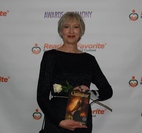Welcome and thank you for reading.
My grandmother used to call me “Robin the Hood” when I was very little. I was understandably confused—and then I learned about the legendary Robin Hood. The nickname became something of a badge of honor, though I have no idea why she would compare me to a thief. I was innocent! Naturally, I read and watched several versions of the tale, but when I read Lady of the Forest, by Jennifer Roberson, I fell in love.
Read more here.
In 1995 an author team wrote Relic, a murder mystery/suspense novel about the New York Museum of Natural History in which paying customers to the museum wind up brutally murdered in the dark corridors and closed off rooms. Graduate student, Margo Green, believes the murderer might not be human.
Read more here.
While I love to read fantasy, I have not selected a fantasy story to share. Rather, I am going back in time to a great and timeless classic. Specifically, my choice is Les Miserables, by Victor Hugo.
I’ve heard people over the years say they gave up on Les Miserables, as a difficult read. I suppose there is something to that. Yet I consider it the most incredibly beautiful tale ever written—the story, sure—but even more so, the manner in which it is told. It is like poetry—no . . . music. Hugo can sum up all of a person's past and present, their experiences, how others perceive them, their likely future—in about a page. Consider, for example, his introduction of the street urchin, Gavroche:
. . . people noticed on the Boulevard du Temple, and in the regions of the Chateau-d'Eau, a little boy eleven or twelve years of age, who would have realized with tolerable accuracy that ideal of the gamin sketched out above, if, with the laugh of his age on his lips, he had not had a heart absolutely somber and empty. This child was well muffled up in a pair of man's trousers, but he did not get them from his father, and a woman's chemise, but he did not get it from his mother. Some people or other had clothed him in rags out of charity. Still, he had a father and a mother. But his father did not think of him, and his mother did not love him.
He was one of those children most deserving of pity, among all, one of those who have father and mother, and who are orphans nevertheless.
This child never felt so well as when he was in the street. The pavements were less hard to him than his mother's heart.
His parents had dispatched him into life with a kick. He simply took flight. He was a boisterous, pallid, nimble, wide-awake, jeering, lad, with a vivacious but sickly air. He went and came, sang, played at hopscotch, scraped the gutters, stole a little, but, like cats and sparrows, gayly laughed when he was called a rogue, and got angry when called a thief. He had no shelter, no bread, no fire, no love; but he was merry because he was free.
Can’t you just picture him?
Perhaps the greatest part of this story for me, however, is the concept of self-sacrifice. Consider, for example, the Bishop of D--, who believed in tithing—in the reverse. He kept ten percent, and gave away ninety.
In my estimation, no other has ever come close to telling a story of self-sacrifice as well as Victor Hugo. Another example of this is his, Toilers of the Sea. It is a very slow read, but if you can get past the continual review of the local flora and fauna, to find your way to the end of the tale, you will once again, discover a story of sacrifice. Reading these tales gives me confidence in the goodness of mankind.





